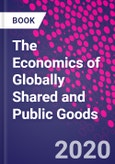The Economics of Globally Shared and Public Goods responds to an urgent need to consolidate and refine the economic theories and explanations pertinent to globally shared resources. Making a clear distinction between theories and empirical models, it elucidates the problem of global public goods while incorporating insights from behavioral economics. Its comprehensive and technical review of existing theoretical models and their empirical results illuminate those models in practical applications. Relevant for economists and others working on challenges of globally shared goods such as climate change and global catastrophes, The Economics of Globally Shared and Public Goods provides a path toward greater co-operation and shared successes.
Please Note: This is an On Demand product, delivery may take up to 11 working days after payment has been received.
Table of Contents
1. An Introduction to the Challenges of Public and Globally Shared Goods in Economics and Policy-making2. The Economics of Public Goods and Club Goods3. The Economics of Global Scale Public Goods: Key Challenges and Theories4. A Critique of the Economics of Global Public Goods: A Microbehavioral Theory and Model5. A Critique of the Economics of Global Public Goods: Economics of Non-cooperative Games6. A Critique of the Economics of Global Public Goods: The Economics of a Global Public Good Fund7. The Economics of Globally Shared Goods8. Extensions of the Economic Theory to a Basket of Globally Shared Goods
Appendix: A Succinct Mathematical Disproof of the Dismal Theorem of Economics








